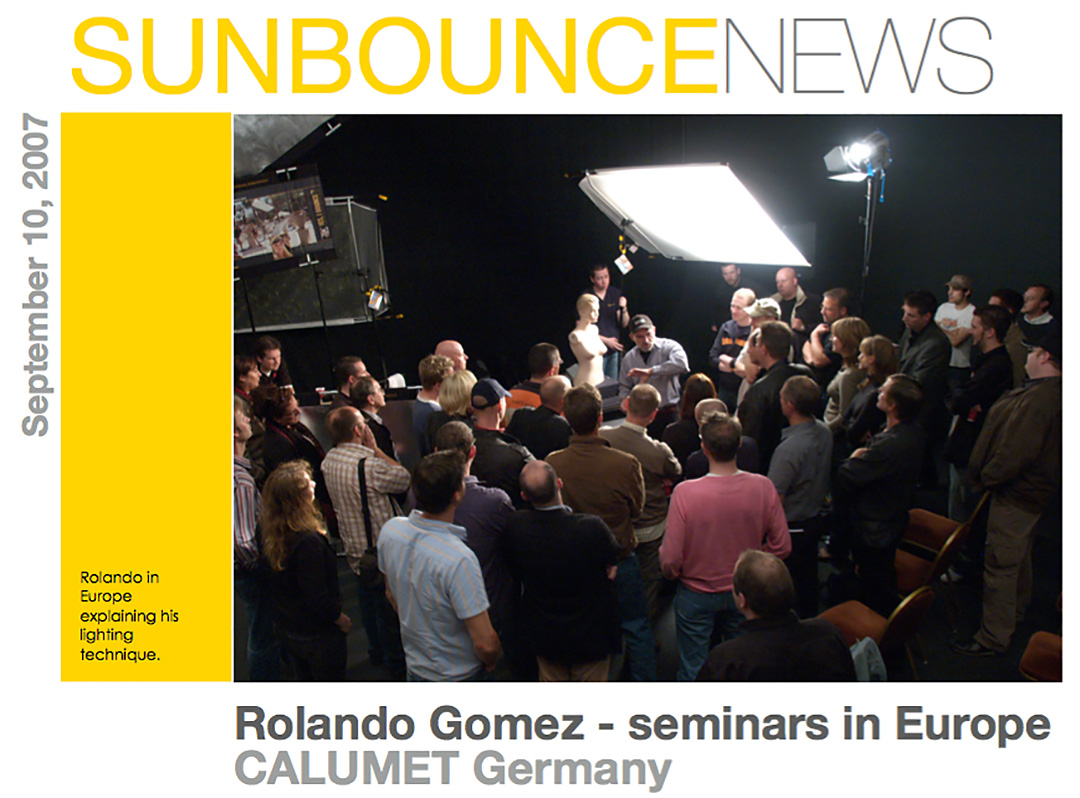Self-Mentoring Is a Must and Possible with Technology Today
There are two important people that help a photographer develop their career, mentors and muses, though, these are two critical career keys that are hard to find, and once lost, not easy to replace, as not one mentor or muse unlocks a photographer’s creativity and success the same. So, finding a mentor or muse, or even better, both, is a positive step in any photographer’s career, but technology has made it easier to fill the muse’s position than the mentor’s shoes.

Photo taken during my Germany, Netherlands, and Belgium photography seminar tour.
A mentor is a photographer’s guidance counselor, whereas a muse is a photographer’s inspiration. A photographer needs a muse in front of the camera, whereas a mentor isn’t required physically on the shoot to provide their potential. Finding a mentor is very difficult, especially today.
Mentors are usually more experienced, someone that will teach, give guidance, provide proactive advice and build trust with their “protégé,” or mentee. From my own experience, finding a mentor is not easy and the role with the mentor is often misunderstood. Many young photographers feel that in order for a mentor to qualify as a true mentor, the photographer and the mentor should work side by side, and unfortunately in photography, that’s rare, for various reasons. My own mentor has mentored me more by phone than in person. He lives in New York, I live on the road.

Photo taken at one of my photography workshops in Las Vegas.
First, most young photographers go after more well-known photographers, in a national or worldly sense, as their mentors. It’s rare you’ll find a top-named photographer looking for protégés. They rarely have time for themselves as they struggle with clients, family, friends, industry contacts, blogs, books, articles, interviews, assignments, travels, and the list goes on—these are super busy people. If there is one thing that’s changed over time that benefits a new photographer looking for a mentor, is social media, such as Twitter, Google and Facebook, which might allow you to get their attention, but only briefly.
The best way to capitalize on these highly sought-after photography mentors is by reading their books, articles, tweets, blog posts and studying their photography. These types of mentors are rarely available for side-by-side mentoring because they are already very established and if they are mentoring someone directly, it’s either their own personal assistant that travels with them, often a budding photographer by nature, or perhaps a close family member. You’re better off hiring a top professional photographer for private instruction, which is often costly considering how valuable their time is on a normal workday, then asking them to take their personal time to mentor you. You can also check out my mentorship program, which again, is based on value as time is not free.
The same goes when asking for a personal critique of your photos or portfolio, these are time consuming tasks that rarely a pro photographer has the extra time to share. I myself, while not at the top of the list of photographer greats, prefer to offer paid for critiques, not because I like to charge, but because my time is valuable and my inbox via email and social media is always full, it’s like a second job. Throw in, that often you get what you pay for. A paid critique is more thorough and tailored vs. “Hey, take a look at my photo, what’d you think?”
Unfortunately, many people don’t realize that and get flustered within minutes after sending me an email or social media message seeking photo critiques, portfolio reviews, looking for assistant positions, etc. And while I do my best to answer these requests personally, it often involves several days out of the month that I really don’t have. Sometimes too, the questions asked are found in my online photography tips here, Quora, or my own personal blog.
Top professional photographers are super busy with crazy schedules, answering hundreds of emails weekly, dealing with clients, working on shoots or projects, and if someone they do not know is fortunate enough to get a message to them asking for a mentorship or even portfolio advice, they’ll be lucky if they even get a response. It’s not that the professional photographer is being rude, it’s just that they are already working absurd hours, a characteristic of self-employment.
Technology also has added more into a professional photographers’ already busy life. Just maintaining websites, blogs and their online portfolios, is more work than before. Then toss in social networking, and more than likely, they’re doing dinner at their keyboard, something rarely found in film days. I myself have grown accustomed to blowing out meal crumbs from my computer keyboard.

My first Rangefinder cover and feature story. Photo taken with a $300 camera.
If anything, technology has probably added a few extra hours to a professional photographer’s daily grind plus extended their weekend and holiday hours to their already long workweek. So, if you actually track a top professional photographer down and speak to them, don’t be alarmed if you get a hurried response or blank stare. All professional photographers are forced into diversity today because of technology and a crazy economy, thus their schedules call for longer hours than normal just to survive. Not to mention, professional photographers have a life too and must allow time for their family, friends, and social life.
Potential protégés must respect that these, caliber of photographers, don’t mean to appear snobbish or standoffish, but it’s like a “new hire” trying to approach the CEO of a waning Fortune 500 company. It rarely happens. Usually the closest you’ll get to see one of these photographers in action is to attend one of their seminars at a national photo trade show or convention where they are a featured speaker, or attend one of their photography workshops, if they’re even offered. On the inexpensive side, look for one of their videos on YouTube, many professional photographers, trying to survive while helping to spread the gospel of photography, have added this to their repertoire.
Now the second tier of potential photography mentors is your local professional photographer, which might not be as worldly known, but they have established themselves in the local community with high-caliber photography of their genre. These photographers are not only just as busy with life and business challenges like their more prominent colleagues, but they’re struggling in today’s photography turmoil due to the diffusion of digital photography down to smart phones and the crazy economic times. The best bet in approaching one of these photographers is through a college internship, which often are non-paid internship positions. But even then, don’t get your hopes up to high.

My fourth photography book featured a cover photo we shot at one of my Virgin Islands photography workshops.
Now all this, national and local mentorship “personal” possibilities, probably sounds bleak, and to put it bluntly, it is and it’s evolved that way because of technology while at the same time, technology has made it easier to get “non-personal” mentorship like advice and knowledge online. The only downfall, for hands-on experience, you’ve got to go do it yourself and learn from yourself—you have to self-mentor.
Great photographers become great because they shoot passionately as much as they can and judge their work critically. Critical judgment, or perhaps it’s better said as “constructive criticism,” doesn’t come without some researched knowledge. The concept here is not to have the blind leading the blind, but to switch eye-glasses when being a self-mentor. Absorb what you can then put it to work, practice then perfect it. Be your own photo editor.
Technology gives us the ability to learn and study more today. Technology gives us the ability to self-mentor because there are so many articles, online books, how-to videos, seminars, workshops, and even webinars to learn from. A new photographer has more to gain than ever, not to mention we have LCD preview screens on the backs of our cameras which helps any photographer see their mistakes or perfect photos as they shoot, thus providing instant feedback—provided a new photographer is studies and absorbs all the materials from the latter mentioned resources and understands what makes a great image better than a bad photo.
Now I know you’re probably thinking, “Wait, I don’t have time to read all those articles and books, view all those online videos, attend seminars or workshops or even stop for a webinar. I don’t even have time to study other photographer’s great photos.”
My only answer to that, “Welcome to the potential mentor’s world.”
Time is the culprit in both directions. It takes time to do it, it takes time to be, it takes time to survive today. The 40-hour workweeks ended with the invention of the computer and evolved into 80-hour workweeks with each stage of technology, something any mentor will tell you. Everyone’s time is limited and valuable, but your time is what you make of it and if you can’t find a mentor, then self-mentor, it’s possible with technology today.



